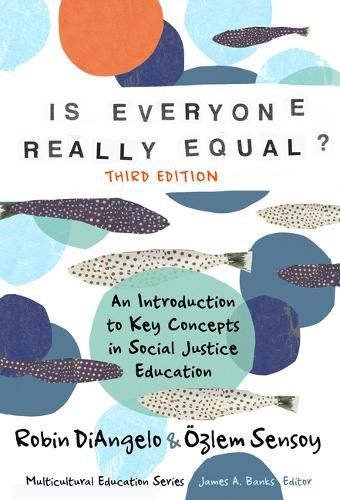Readings Newsletter
Become a Readings Member to make your shopping experience even easier.
Sign in or sign up for free!
You’re not far away from qualifying for FREE standard shipping within Australia
You’ve qualified for FREE standard shipping within Australia
The cart is loading…






This is the long-awaited third edition of the bestselling, multi-award-winning introduction to foundational concepts in social justice education.
Accessible to students from high school through graduate school, this comprehensive resource addresses the most common stumbling blocks to understanding social justice. In response to the deep divides in public discourse, this edition provides a framework for reaching common ground on issues of justice within a pluralistic democracy. The authors have updated statistics, research, and examples, and revised discussion questions and extension activities to guide classroom dialogue and engagement with today's complex issues. New topics include the science of sex and gender, and the political backlash against equity and racial justice efforts. The authors trace the roots of white supremacy globally in the history of colonialism. Concepts such as oligarchy, kleptocracy, and capitalism's relationship to democracy are introduced and discussed. Is Everyone Really Equal? is an up-to-date and engaging textbook and professional development resource that includes many user-friendly features, examples, vignettes, and activities to not just define but illustrate key concepts.
Book Features:
User-friendly features such as accessible language, "definition boxes" to reinforce concepts, "perspective checks" to acknowledge multiple viewpoints, and "stop boxes" that anticipate and address common points of resistance. A glossary that includes an explanation of social justice language and its complexities and changes over time. Discussion questions, extension activities, and exercises for book groups and classroom study. An accessible resource for instructors in disciplines including education, sociology, political science, criminal justice, nursing, social work, health sciences, gender and sexuality studies, and race and ethnic studies in the United States and Canada.
$9.00 standard shipping within Australia
FREE standard shipping within Australia for orders over $100.00
Express & International shipping calculated at checkout
Stock availability can be subject to change without notice. We recommend calling the shop or contacting our online team to check availability of low stock items. Please see our Shopping Online page for more details.
This is the long-awaited third edition of the bestselling, multi-award-winning introduction to foundational concepts in social justice education.
Accessible to students from high school through graduate school, this comprehensive resource addresses the most common stumbling blocks to understanding social justice. In response to the deep divides in public discourse, this edition provides a framework for reaching common ground on issues of justice within a pluralistic democracy. The authors have updated statistics, research, and examples, and revised discussion questions and extension activities to guide classroom dialogue and engagement with today's complex issues. New topics include the science of sex and gender, and the political backlash against equity and racial justice efforts. The authors trace the roots of white supremacy globally in the history of colonialism. Concepts such as oligarchy, kleptocracy, and capitalism's relationship to democracy are introduced and discussed. Is Everyone Really Equal? is an up-to-date and engaging textbook and professional development resource that includes many user-friendly features, examples, vignettes, and activities to not just define but illustrate key concepts.
Book Features:
User-friendly features such as accessible language, "definition boxes" to reinforce concepts, "perspective checks" to acknowledge multiple viewpoints, and "stop boxes" that anticipate and address common points of resistance. A glossary that includes an explanation of social justice language and its complexities and changes over time. Discussion questions, extension activities, and exercises for book groups and classroom study. An accessible resource for instructors in disciplines including education, sociology, political science, criminal justice, nursing, social work, health sciences, gender and sexuality studies, and race and ethnic studies in the United States and Canada.